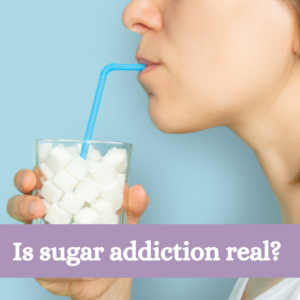 Is Sugar Addiction Real? I know this is going to stir up a lot of emotions in people but I also know that this question needs to be asked, so lets go. Stick with me to til the end. 😉
Is Sugar Addiction Real? I know this is going to stir up a lot of emotions in people but I also know that this question needs to be asked, so lets go. Stick with me to til the end. 😉
Firstly most people who talk about addiction don’t even know what addiction is. There was a famous study called “the rat park experiment” that was actually done here in Canada. The researcher that conducted this, basically didn’t believe that addicts were sick people, or that they were genetically flawed. Or that if you give them a little bit of morphine and they become addicts for life. So he created this study where he took these rats and separated them into 2 groups. He got them both addicted to morphine. He kept one group in their normal rat cages, which is not particularly nice, but that’s what they are used to. And then the other group, he basically put in an amusement park for rats. It had bright colors, running wheels, didn’t smell of urine, and they were not harassed by sadistic lab assistants poking them with needles. Both groups of rats also had a free source of morphine in their water.
So the rats that were in the cage, they learned to press the lever to release more morphine into their water because they kept wanting it to help them deal with their miserable existence. But the other group of rats in the “amusement park”, who were having a great time, basically voluntary detoxed from their addiction over time. Even though for the first week or so, they experienced pretty painful symptoms including seizures. But they refused to touch the morphine, they didn’t feel they needed it.
So he, Dr Bruce Alexander, came to the conclusion that addiction is a desperate attempt at self medication. Your perceiving that something in your environment is temporarily relieving you of your symptoms, of whatever it is that is bothering you. Even though you know that in the long run, its making things worse. Sound familiar? But if you are a sick person, and something is really bothering you, your not going to be worried about the future. Your focused on the here and now, and will attempt to medicate the problem with your drug of choice to help you feel better – sugar, alcohol, exercise, sex, gambling etc.
Addiction is usually an attempt to medicate a condition like, unhappiness, depression, chronic pain – essentially low dopamine.
So the research shows us that the whole theory about addiction being tied to dopamine is correct, but its that people who have the tendency for addiction are usually people under a tremendous amount of stress and unhappiness. And these people run on cortisol and adrenaline (#adrenalinedominance) that is very high, and dopamine is very low. These people crave hedonistic activities, whether that’s drugs or exciting experiences or activities – we would call these people adrenaline junkies. And yes food can be hedonistic. Anything that someone would start to do on a pathological level, medicine says “this is a junkie”, he or she needs to go to rehab. They need to be weened off their addiction.
But if you don’t change the environment of the addict, they will immediately slip back. Its not a coincidence that up to 85% of alcoholics anonymous relapse after 12 months of being out of the program. Nearly everybody relapses. Because they are not changing the environment or circumstance that caused the addiction in the first place.
Its been demonstrated in as early as the 1960’s that administering a chemical, which is now illegal, but at the time it wasn’t, know as LSD, (which as very potent anti serotonin and pro dopamine effects) cures every addition. It was also given to people in prison. Violent criminals and repeat offenders, all of these people when they got out of prison, they stopped being criminals when they had been treated with LSD. They went back and rejoined society. Almost everybody else who did not get LSD, relapsed and committed crime again.
The word “addiction” is really the wrong word. Its organisms/people who believe consciously or subconsciously that sugar (or whatever the drug of choice is), relieves some kind of issue or discomfort. Again, people who crave sugar tend to have very high levels of cortisol and relatively low levels of dopamine – they go hand in hand. Also the so called “addictive personality” type, they unusually have an already established endocrinological disorder driven by chronic stress, trauma in early childhood, or maybe the mom had issues when she was pregnant with them, or they may have inherited something genetically (yes its possible).
You see, when your young, sugar and these other substances, and even cortisol to an extent, can give you the sense of euphoria. But as you get older and your anti cortisol hormones drop with age, your adrenals start to atrophy, and the gonads are not functioning optimally anymore either, then your left only with the negative effects of cortisol and adrenaline.
Note: Its know that anti cortisol and anti serotonin drugs treat bipolar which is a cortisol driven type of mania. Its also been know since the 1960s that anti serotonin drugs treat addiction. Anything that blocks serotonin, decreases cortisol and increases dopamine. Basically blocking the stress response and allowing the organism to get back to normal/health. Once you get back to health, all of these cravings usually disappear. I know someone is saying “but wait I thought serotonin is good?”…yes it is in context and at low doses.
Its believed that more then 80% of people with addictions can resolve the issue by themselves by changing the environment, reducing the stress response and increasing dopamine (being productive, finding happiness, progressing in life, feeling like your achieving your goals, being loved etc). And the other 20% are people who’s environment didn’t change and they need their “fix” to help them deal with the stress.
As for sugar… Sugar lowers the stress response, calms you down, supports the thyroid and adrenals, and improves metabolism. When its framed like that – who wouldn’t want sugar? So the problem is not sugar but the underlying problem of low dopamine and not feeling good.
Consider this; Why do people use cocaine? It’s not because it makes them feel good per se, it’s because it gives them energy. And cocaine, at least in the early stages of usage and depending on the dosage, has a pro dopamine effect. And by no means am I encouraging or celebrating the use of cocaine! This is for educational purposes.
Another consideration; there is nothing addictive about feeling good. If you define life like that, then our entire life becomes a disease or illness.
“Everything good in life is illegal, immoral or fattening.” – Alexander Woollcott. That expression right there tells us that maybe the attitude towards life needs to change. We have managed to define some things that are pillars of life, like sugar and rest, as bad.
So in summary;
When we look at it, and at the research, we see that all addictions have 2 things in common – there’s chronic stress/trauma and the organism is desperately trying to mitigate it by boosting dopamine. And that manifests in different ways in different people. Sugar is one way, cocaine is another, promiscuity, gambling, etc. All of these things give you a dopamine rush. Which medicine tries to define as pathological, but the only reason most people continue to do it is because the baseline dopamine is low. Desperate people will go to desperate measures.
If you are craving something, you should evaluate why your craving it? What’s causing you to crave it? And usually the answer is found in stress or unhappiness or tiredness ()which is also a stress and can make us unhappy or struggle to find joy). And also evaluate how the craving makes you fell when you give into it! You will find answers.
Work on your cortisol and stress, and do more of what makes you feel happy and fulfilled. And again, the next time you have cravings, stop and reflect on what’s driving them? How do you feel? And what else can you do to reduce your cortisol and increase your dopamine? Walking in fresh air and exercise is known to boost dopamine. As well as completing tasks – that “to do list”.
One side note too, is that fat and sugar (carbohydrate) food combinations have been shown to be more addictive then sugar alone. Think cookies, chips and donuts. Part of this is because these foods are high in polyunsaturated fatty acids. And Pufas are know to activate opioid receptors in the brain. Very similar to morphine and heroine.
And if you have been following my work for a while now you know Pufas slow metabolism and thyroid, increase adrenal dysfunction, gut issues and inflammation, and increase feelings of sadness and depression.
Ref; https://www.sciencedaily.com/releases/2018/06/180614213837.htm
Rat park study; https://www.psychiatrictimes.com/view/what-does-rat-park-teach-us-about-addiction
Chronic stress, vulnerability and addiction study; https://www.ncbi.nlm.nih.gov/pmc/articles/PMC2732004/
“Stress is a well-known risk factor in the development of addiction and in addiction relapse vulnerability. A series of population-based and epidemiological studies have identified specific stressors and individual-level variables that are predictive of substance use and abuse. Preclinical research also shows that stress exposure enhances drug self-administration and reinstates drug seeking in drug-experienced animals. The deleterious effects of early life stress, child maltreatment,…”
“This review focuses on the accumulating evidence from preclinical, clinical, and population studies that highly stressful situations and chronic stress increase addiction vulnerability, that is, both risk of developing addiction and risk of relapse. The types of stressors that increase addiction risk are identified in Table 1. The stressors tend to be highly emotionally, distressing events that are uncontrollable and unpredictable for both children and adults. ”
I hope you found this conversation educational, helpful, interesting and insightful. And it has maybe given you something to consider on your own journey.
Audio conversation around this article including a few more considerations from me;
Best regards always,

